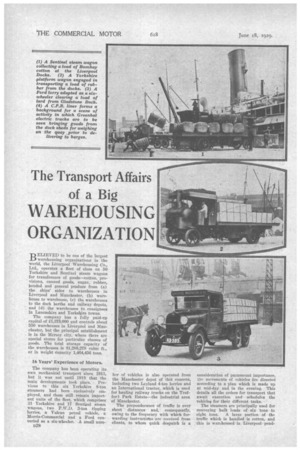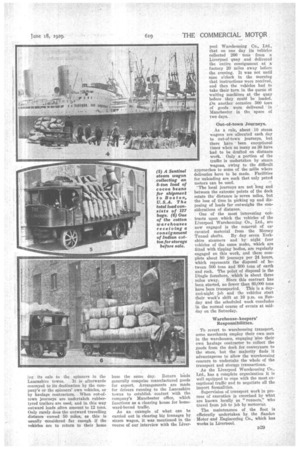The Transport Affairs of a Big
Page 90

Page 91

If you've noticed an error in this article please click here to report it so we can fix it.
WAREHOUSING ORGANIZATION
BELIEVED to be one of the largest warehousing organizations in the world, the Liverpool Warehousing Co-, Ltd., operates a fleet of close on 50 Yorkshire and Sentinel steam wagons for transference of goods—cotton, provisions, canned goods, sugar, Tubber, bonded and general produce from (a) the ships' sides to warehouses in Liverpool and Manchester, (b) warehouse to warehouse, (c) the warehouses to the dock berths and railway depots, and (d) the warehouses to consignees In Lancashire and Yorkshire towns.
The company has a folly paid-up capital of 11;375,000 and controls about 550 warehouses in Liverpool and Manchester, but the principal establishment is in the Mersey city, where there are special stores for particular classes of goods. The total storage capacity of the warehouses is 81,208,278 cubic ft., or in weight capacity 1,464,456 tons.
16 Years' Experience of Motors.
The company has been operating its own mechanical transport since 1913, but it was not until 1918 that the
main developments took place. Previous to this six Yorkshire 8-ton steamers had been exclusively employed, and these still remain important units of the fleet, which comprises. 31. Yorkshire and 17 Sentinel steam wagons, two F.W.D. 3-ton tipping lorries, a Vulcan petrol vehicle, a Morris-Commercial and a Ford converted as a .six-wheeler. .A small num
D28
ber of vehicles is also operated from the Manchester depot of this concern, including two Leyland 4-ton lorries and an International tractor, which is used for hauling railway trucks on the Trafford Park Estate—the industrial area of Manchester.
The preponderance of traffic is over short distances and, consequently, owing to the frequency with which forwarding instruetions are receivedfrom clients, to whom quick despatch is a consideration of paramount importance, ine movements of vehicles tirc directed according to a plan which is made up at mid-day and in the evening. This details all the orders for transport that await execution and schedules the vehicles for their different tasks.
The steamers are principally used for convoying bulk loads of six tons to eight tons. A large portion of the traffic which is handled is cotton, and . this is warehoused in Liverpool peml Fag its sale to the spinners in the Lancashire towns. It is afterwards conveyed to its destination by the company's or the spinners' own vehicles, or by haulage contractors. When out-oftown journeys are undertaken rubbertyred trailers are used, and in this way outward loads often amount to 12 tons. Only rarely does the outward travelling distance exceed 50 miles, as this is usually considered far enough if the vehicles are to return to their home base the same day. Return loads generally comprise manufactured goods for export Arrangements are made for drivers running to the Lancashire towns to establish contact with the company's Manchester office, which functions as a clearing house for homeward-bound traffic.
As an example of what can be carried out in clearing big tonnages by steam wagon, it was mentioned in the course of our interview with the Liver pool Warehousing Co., Ltd., that on one day its vehicles collected 200 tons from a Liverpool quay and delivered the entire consignment at a factory 20 miles away before the evening. It was not until nine o'clock in the morning that instructions were received, and then the vehicles had to take their turn in the queue ot waiting machines at the quay before they could be loaded. f)n another occasion 500 tons of goods were delivered in' Manchester in the space of two days.
Out-of-town Journeys.
As a rule, about 10 steam wagons are allocated each day to out-of-town journeys, but there have been exceptional times when as many as $O have had to be drafted on distance work. Only a portion of the traffic is undertaken by steam wagons, owing to the difficult approaches to some of the mills where deliveries have to be made. Facilities for unloading are such that only petrol motors can be used.
'The local journeys are not-long and between the extreme points of the dock estate the distance is seven miles, but the loss of time in picking up and disposing of loads far outweighs the considerations of distance.
One of the most interesting contracts upon which the vehicles of the Liverpool Warehousing, Co., Ltd., are now engaged is the removal of exe eavated material from the Mersey Tunnel shafts. By day seven Yorkshire steamers and bynight four vehicles of the same make, which are fitted with tipping bodies, are regularly engaged on this work, and these complete about SO journeys per 24 hours, which represents the disposal of between 500 tons and 600 tons of earth and rock. The point of disposal is the Dingle foreshore, which is about three miles away. Since this contract has been started, no fewer than 60,000 tons have been traneported. This is a daymid-night job and the vehicles start their week's shift at 10 p.m. on Sunday and the scheduled week concludes in the normal course of events at midday on the Saturday.
Warehouse-keepers' Responsibilities.
To revert to warehousing transport, some merchants employ their own men in the warehouses, engaging 'also their own haulage contractor to collect the goods from the dock for conveyance to the store, but the majority finds it advantageous to allow the warehousing concern to undertake the whole of the transport and storage transactions.
As the Liverpool Warehousing Co., Ltd., has a complete organization it is well equipped to cope with the most exceptional traffic and to negotiate all the import formalities.
Supervision of transport work in process of execution is exercised by what are known locally as " runners," who travel from job to job by motorcar.
The maintenance of the fleet is efficiently undertaken by the Sandon Motor and Engineering Co., which has works in Liverpool.








































































































































































































